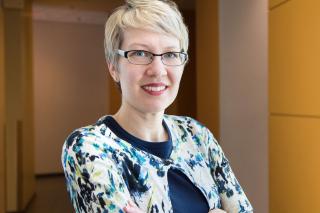Laura Saunders, Interim Director of Simmons School of Library and Information Science shared details on her recent discussion about the library field's role in intellectual freedom, as well as the current ethical and legal implications of that support.
"There has been a lot of discussion of neutrality in libraries over the last couple years," said Saunders, who defined neutrality in this particular sense to mean apolitical. "I feel we're mixing up ideas of neutrality and intellectual freedom. We don't judge what people want to read, and we're confusing that with being neutral. It's still not a neutral position, because we are supporting intellectual freedom."
That support of intellectual freedom is a core value in the library and information science (LIS) profession, as stated in the American Library Association (ALA) code of ethics, along with dismantling systemic and individual biases, confronting inequity and oppression, and enhancing diversity and inclusion. And there lies the conflict Saunders highlights. "How can we support intellectual freedom if, in some cases, one person's freedom involves materials, resources, and speech that is offensive to other people?" She asks. "How can we be inclusive and welcoming and support marginalized voices at the same time?"
There is no easy answer to this issue, but Saunders suggests points for further discussion.
"When we talk about being inclusive, socially responsible, and antiracist, in some cases that has taken the form of deciding for people what might be offensive," says Saunders, noting that librarians may decide not to include particular materials in their collection out of concern for certain marginalized groups who may find the material offensive. "In this case, we're taking a patriarchal approach, by deciding what may be potentially offensive. This is problematic, especially because the field of LIS is so White and middle-class."
Saunders had a particularly enlightening experience while teaching a class on Intellectual Freedom in Rome, Italy. She was translating a presentation by a guest speaker, who made a racist remark in the class. "I paused and made a quick decision to not translate what he said, because I thought it was offensive," she recalls. "He knew I hadn't translated it, and all of the students caught on. He wanted me to translate exactly what he said."
During a debrief at the end of the class, students expressed their feelings over Saunders' actions. "This was a class in intellectual freedom, and I was censoring the speaker. Students were more upset that I wasn't translating what he said than with what he said, because I wasn't giving them the option to listen to the person or not. I hadn't even considered this response. By making decisions on what people can see or hear or listen to, even when we think we're being helpful and not promoting hate speech, we're also taking something away from the people we think we're helping. We're taking away their opportunity to understand what's happening, who is saying what, and allowing them to make a decision for themselves."
Saunders suggests that supporting intellectual freedom in a socially responsible way could mean giving everybody the opportunity to decide for themselves. That said, even freedom of speech has legal limitations. "It's not about giving preference to one or the other point of view, but how do we balance the two? Leaving it as a free for all to say what you want can create a situation where those who are marginalized will feel excluded and unsafe, and won't feel welcome in our spaces."
While the codes and guidelines don't offer absolute answers, Saunders encourages library professionals to interpret the context of each individual situation. "There isn't going to be a one-size fits-all answer. We tend to err on the side of freedom of speech, because that's a core value. But it's impossible to have a blanket standard for how we do things."
She also notes that every library and every librarian is working in their own context. She urges librarians to see where they have support, and try to rally that support. "According to broad, national studies, the vast majority of people support public libraries," she notes. "Even people across different political leanings are against banning books. That suggests that in almost any community there would be people who would rally against censorship and in support of the library."
The key, particularly for public or school libraries under threat of censorship, is to raise awareness of the issue. "People are supportive [of librarians] in the abstract, but in reality they aren't doing anything because they aren't aware of the issues. Make sure people know what's going on, and offer opportunities for them to make their voices heard." While advocacy on a national level is important, rallying awareness at the community level is vital. "Local government officials are beholden to their tax payers," says Saunders. "If they believe they have the support of the community on their side, they don't need to listen to anyone else."
Overall, librarians should be wary of assumptions of neutrality. "If we were to buy into this idea, then we can't even advocate for ourselves, because that's a political position. But we have to advocate for ourselves on issues that directly impact the library and the community."

